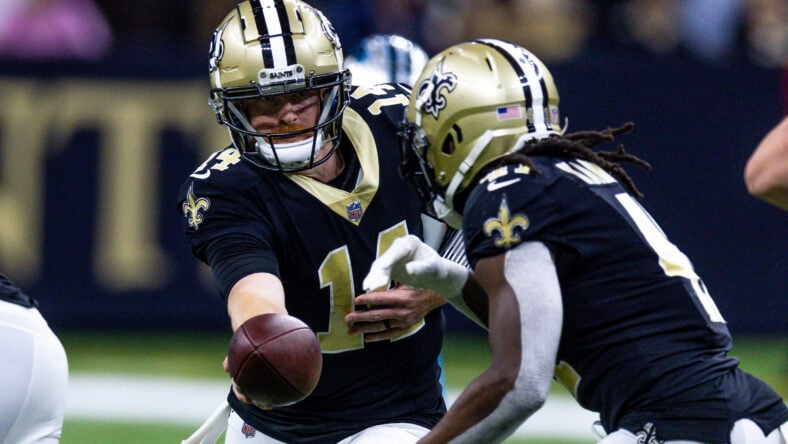Zac Stacy “Bodyslam Heard Round the World” Brings Domestic Violence Victims Out From Shadows, Much Like Ray Rice Incident
The infamous video of former Baltimore Ravens Running Back Ray Rice was often called the “punch heard round the world.” The video which led to Rice being suspended and eventually permanently blackballed from the NFL, started a movement against domestic violence across the country.
The League’s mishandling of the situation, including an initial lax suspension and its failure to find the video which was later leaked to TMZ, led to a transformation of its domestic violence policy. Since then, domestic violence incidents result in a minimum six-game suspension for a first time offense.
The League has been on a mission to combat the negative publicity and public reprimand it endured from the Rice incident and transform its image as tough on domestic violence.
But the Zac Stacy incident happened after he left the NFL and shines a light on an issue the NFL is failing to address: the effects of an NFL career on criminal activity.
It’s unclear if Stacy has brain damage and if you saw the video it would be hard to blame it on anything, even severe CTE. However, the alarming domestic violence incidents by players in and retired from the league demands an investigation. It’s not just brain damage that may be a contributing factor to aggression, it’s also the constant violence the game celebrates day in and day out.
Much like veterans that come back from war, NFL players may struggle with a variation of PTSD, namely how to wind down after years of violence on the field. Having no place to channel their aggression, it sometimes, unfortunately gets taken out on innocent women and children by 200lbs plus size weapons of men.
In the horrific video shared on social media, former Jets Running Back Zac Stacy body slams his ex-girlfriend multiple times, throwing her into a television and down to the ground in front of their five-month-old son who is just feet away.
It is sickening to watch but some survivors and victims of domestic violence found the sharing of the cruel truth cathartic. Many began tweeting that they too are former victims or “survivors” of domestic violence.
Similarly, back in 2014, the Rice incident also opened a door for women living in the shadows as domestic abuse victims and survivors to come out, ask for help, and tell their stories.
From the second the story popped up on the internet on TMZ Sports, its tentacles reached households across America, penetrating the moral fabric of American culture & awakening decades long, grassroots efforts to bring awareness to domestic violence.
It didn’t just shock the national conscience, it harkened a battle cry. As millions watched the video, Rob Valente, a consultant with the National Domestic Violence Hotline sat at a Washington D.C. hotel eating breakfast. She was getting ready to join hundreds of domestic violence advocates at a conference to celebrate the 20th anniversary of the Violence Against Women Act.
It was the first federal legislation to recognize domestic violence and sexual assault as crimes, setting up a special division at the Department of Justice and earmarking over a billion dollars to assist women and prosecute perpetrators.
As Valente sipped her coffee with NDVH CEO Katie Ray-Jones, their phones began blowing up. The website was down and the hotline on the verge of crashing. Valente soon found out why. The Ray Rice video. “[T]housands of calls were from women who recognized themselves in the video and were reaching out for help and information for the first time,” Valente told Think Progress.
Weathered advocates had long struggled to gain their substantive foothold amid a shallow, celebrity obsessed media but now a celebrity obsessed website had ironically answered their call. Former TMZ Sports Executive Producer Evan Rosenblum once told a local reporter, the Ray Rice video “started a dialogue about domestic violence in America.” From the moment it went live, producers, editors and reporters knew it would create a firestorm, mainly because of who threw the punch.
While some celebrities defended Ray Rice, they were few and far between. The story grew into a beast and the headlines attracted attention from the nation’s capital. Moments after the Ravens cut Rice from the team, President Barack Obama’s Press Secretary released a stinging statement.
“The President is the father of two daughters. And like any American, he believes that domestic violence is contemptible and unacceptable in a civilized society…Hitting a woman is not something a real man does, and that’s true whether or not an act of violence happens in the public eye, or, far too often, behind closed doors…Stopping domestic violence is something that’s bigger than football – and all of us have a responsibility to put a stop to it.”
Across Twitter, Janay Rice’s story inspired a movement. Throughout the day, as millions watched the video, people on Twitter began to question why Janay stayed with Ray. Some insensitively called her a gold digger and others insinuated she was weak.
The victim shaming caught the attention of thirty-one-year-old human resources manager, Bev Gooden. She fired back, tweeting,
“She shouldn’t be judged. Many women stay. I stayed with mine until I could afford to leave and get divorced.”
The dialogue prompted Gooden to tweet a series of testimonials related to her own abusive relationship with her ex-husband to draw attention to the complexities of abuse and help people realize, it wasn’t so easy to leave.
She hashtagged it #whyistayed. “I stayed because I thought it would get better. It never got any better,” she wrote.
“He said he would change. He promised it was the last time. I believed him. He lied,” she continued.
“I stayed because my pastor told me that God hates divorce. It didn’t cross my mind that God might hate abuse, too. I tried to leave the house once after an abusive episode, and he blocked me. He slept in front of the door that entire night.”
As retweets disseminated Gooden’s painful memories across thousands of Twitter feeds, her story resonated. The spotlight shifted and battered faces began to publicly emerge from age-old shadows of isolation.
Other women joined her.
“I stayed because I was hundreds of miles from home, young & very scared,” one woman wrote.
“I stayed because I was embarrassed, ashamed, and scared. I felt isolated despite having friends. I felt stupid,” another victim wrote.
Someone else continued, “I stayed because I loved him as much as I feared him. My mom was never happy with my father. I thought abuse was normal.”
Gooden continued, “I stayed because I was halfway across the country, isolated from my friends and family. And there was no one to help me. I stayed because I couldn’t afford to leave. I saved grocery money every week to escape.”
“He would fire his gun in the air unexpectedly every now and then to remind me, he could kill me,” wrote one survivor.
Gooden replied, “Mine would wake me up by choking me to remind me that he was in control, even while I slept.”
On the first day the public saw the Ray Rice video, the #whyistayed hashtag went viral and domestic violence became a part of the national dialogue.
Bev Gooden’s honesty and the public support for #whyistayed empowered victims. #Whyistayed was tweeted more than 40,000 times in one day and 100,000 times within two days.
Dr. Phil, Good Morning America, HLN and a variety of other national shows hurried to get Gooden on to discuss her own courageous plight with her abusive ex-husband. Gooden would go on to become a domestic violence advocate and nationally coveted public speaker and #whyistayed would become a precursor to full blown hashtag activism.
It was one of the first of many important social movements that began on social media and fanned out to evoke protest, change, and justice. Some movements would result in millions of dollars in funding for causes and even the reform and creation of new laws.
The topics spanned from gun violence (#neveragain) to charity challenges (#alsicebucketchallenge) to the #blacklivesmatter movement for racial equality, which first appeared in hashtag form on social in 2013 but gained hashtag momentum in late 2014, and many more.
In 2017, actress Alyssa Milano used Twitter to encourage survivors to tell their stories of sexual abuse and sexual harassment in the wake of a flurry of incriminating allegations against Hollywood movie mogul Harvey Weinstein. She told people to hashtag it #metoo. Weinstein’s eventual conviction for rape and the accompanying Hollywood revolution against male chauvinism would become one of the biggest stories of the twenty-first century.
While the media molded the Rice story to fit a larger purpose, the public used every available online outlet to pass judgment.
For Janay, Gooden’s story and those of other abuse victims didn’t match hers. As hard as it was for people to believe, Janay claimed Ray had never hit her before. They had always had a loving relationship she said.
That night in February, the pair was drunk, but the ticking time bomb had been building for a while. The couple had been weighed down by Rice’s newfound fame and his failure to address the painful issues from his past. Janay struggled to care for a new baby with little participation from Ray, who opted to throw himself into football and charity. They had been frequently bickering, and Janay told ESPN she wanted their Valentine’s Day getaway at the Revel to be just about them. When Ray invited friends and tried to go off on his own, married to his phone, Janay lost it. Cursing and spitting followed from them both and then the impulsive, emotional, reactive punch.
As much as people wanted to compare Janay Rice to Bev Gooden, and intertwine the Rice’s split-second episode with tales of longstanding terroristic relationships, that simply wasn’t their situation, according to her. It wasn’t their story.
On September 9, 2014, Janay typed an emotional open letter to the public on her Instagram account. Her words emanated fear, sorrow, anger, helplessness, frustration, humiliation, regret, determination, and hope all rolled into one short paragraph.
“I woke up this morning feeling like I had a horrible nightmare, feeling like I’m mourning the death of my closest friend. But to have to accept the fact that it’s reality is a nightmare in itself. No one knows the pain that the media & unwanted opinions from the public has caused my family. To make us relive a moment in our lives that we regret every day is a horrible thing. To take something away from the man I love that he has worked his ass of[f] for all his life just to gain ratings is horrific. THIS IS OUR LIFE! What don’t you all get. If your intentions were to hurt us, embarrass us, make us feel alone, take all happiness away, you’ve succeeded on so many levels. Just know we will continue to grow & show the world what real love is! Ravensnation we love you!”
Now, seven years later, the horrific “body slam heard round the world” is bringing domestic violence victims out of the shadows again. The hope is that Stacy’s status as a retired player doesn’t allow the league to shy away from its responsibility to investigate why this happened and what role, if any, Stacy’s brain and football career played in it. The disturbing trend of domestic violence in the NFL has not stopped since the Rice incident and as time has gone on, players have been welcomed back for second chances. It’s time the NFL wakes up and steps up.
Categorized:LOJ Exclusives NFL Social Justice The Latest



